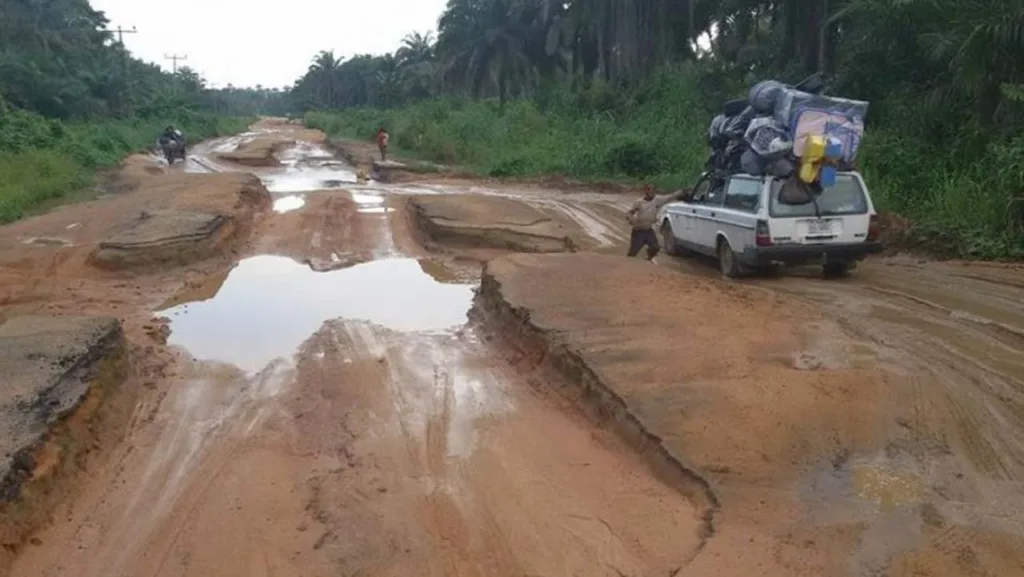Top 10 Nigerian States With Bad Road Network (2024)
Did you know that Nigeria has one of the worst road networks in the world? With a staggering number of bad roads, the country’s infrastructure poses significant challenges for its citizens and the economy.
A nation’s infrastructure is the backbone of its development, and good roads are a crucial component of this foundation. They facilitate the movement of people, goods, and services, fostering economic growth, trade, and social interaction. Unfortunately, Nigeria currently faces significant challenges in maintaining its road network, with many regions suffering from poor road conditions.

This post delves into the state of Nigerian roads, specifically exploring the top 10 states with the most concerning road networks.
We’ll delve into the factors that contribute to this ranking, highlighting specific examples of the challenges faced by these states.
We also aim to shed light on the impact of bad roads on the lives of Nigerians and the nation’s economy.
UNDERSTANDING THE RANKING CRITERIA
Determining the “badness” of a state’s road network can be subjective, but this ranking relies on several key factors:
- Percentage of unpaved roads: This reflects the lack of basic asphalt or concrete surfaces, creating significant challenges for mobility and safety.
- Frequency and severity of potholes: These road defects, often caused by wear and tear, vehicle weight, and inadequate maintenance, contribute to accidents and damage vehicles.
- Extent of ongoing repairs and construction: While ongoing construction can be disruptive, it also indicates an effort to improve the road network.
- Safety concerns: This includes factors like accident rates, inadequate signage, and poor lighting, which contribute to risks for motorists and pedestrians.
It’s important to note that this ranking is based on available data as some of these states have started laying the foundations to repair their bad roads and may not perfectly capture the nuances of each state’s situation.
This article aims to inform and provide a general overview of the states facing the most significant challenges with their road networks in Nigeria today.
TOP 10 STATES WITH BAD ROADS IN NIGERIA (2024)
From the bustling streets of Lagos to the serene towns of Benue, poor road conditions have become a daily struggle for Nigerians.
The impact of bad roads on transportation, safety, and economic development cannot be ignored.
Here are the top 10 Nigerian states with the worst road infrastructure and we also explore the consequences of this alarming issue.
ABIA STATE
Abia State, has been ranked as the worst state with bad roads in virtually every local government areas. Although, often referred to as “God’s Own State,” it has unfortunately been plagued by a deteriorating road network. Despite the state’s significant economic impact, especially through the thriving Aba market, the government has neglected road maintenance. As a result, the roads have degenerated to a point where driving becomes nearly impossible due to large potholes and during the rainy season, leading to flooding and other associated issues.
EDO STATE
The road network in Edo State is plagued by poor conditions, making it one of the states with the worst roads in Nigeria. Traveling on these roads can be an arduous task due to the presence of numerous potholes and deteriorated surfaces. The state capital, Benin City, suffers especially, as its roads are riddled with potholes to such an extent that it’s difficult to ascertain if any proper maintenance has ever been carried out.
This dire situation is further exacerbated by the dangerous Benin Bypass route, which poses additional risks to motorists navigating through Edo State.
IMO STATE
Imo State, once known as the Land of Hope, faces a dire situation when it comes to its road network. Despite having a governor named Hope and a name that translates to “the road is good,” the reality is quite different. The roads in the state capital, Owerri, have deteriorated to the point where residents have started creating alternative routes. It is clear that road infrastructure in Imo State is far from satisfactory.
ANAMBRA STATE
Anambra State, known for its commercial prowess, is grappling with the devastating effects of erosion on its road network. Despite receiving funds from Nigeria’s Ecological Fund, major highways in the state, including Ekwulobia, Oko, Isuofia, and Igboukwu, have been heavily impacted. The state’s prominent commercial hub, Onitsha Main Market, and the presence of Innoson Motors have not translated into adequate road infrastructure. The Governor of the state claims of progress are contradicted by the persistently uneven roads across Anambra State.
LAGOS STATE
Lagos State, often referred to as the “center of excellence,” sadly has one of the worst road networks in Nigeria. The constant traffic congestion, particularly around the Apapa ports, significantly contributes to the poor state of the roads. Residents of Lagos have become all too familiar with spending hours in traffic or resorting to long walks, even for essential appointments. Despite media portrayals of infrastructure development, the reality is that majority of the state’s road network remains inadequate and impassable.
RIVERS STATE
In Rivers State, particularly in Port Harcourt, residents have adapted to the poor road conditions by utilizing trucks and SUVs. Small cars are mostly used by private and cab-hailing service drivers who know how to navigate the city’s roads. Potholes and other road defects are widespread, with some appearing as if they were dug overnight. The situation is even worse in smaller towns within the state.
BENUE STATE
Benue State in Nigeria has been facing a significant challenge with its road infrastructure. Over the years, the deteriorating road networks in the state have reached a pitiful state that goes beyond what the citizens can manage. The capital city of Makurdi, along with other towns, bears the burden of broken and washed-away roads. However, the focus on poor road maintenance has somewhat been overshadowed by the state’s insecurity challenges.
ROAD INFRASTRUCTURE CHALLENGES IN NIGERIA
Nigeria, as a whole, faces significant road infrastructure challenges. The country’s road network spans approximately 195,000 kilometers, but only about 60,000 kilometers are paved, leaving a vast portion in dire need of attention. Poor maintenance practices and the use of low-quality materials contribute to the prevailing road infrastructure issues.
The economic impact of bad roads in Nigeria is substantial. The hindered state of the road networks directly affects economic growth and development. It creates obstacles for transportation and logistics, making it difficult for businesses to operate efficiently. The cost of vehicle maintenance and repairs increases, further burdening individuals and the economy.
Moreover, the prevalence of bad roads in Nigeria contributes to road accidents and fatalities. The poor conditions, including potholes, deteriorated surfaces, and inadequate road signage, increase the risk of accidents and endanger the lives of road users. This not only results in the loss of human lives but also adds to the burden on the healthcare system and society as a whole.
To address these challenges, investment in road infrastructure is crucial. The Nigerian government, at both the federal and state levels, should prioritize the improvement and expansion of the road network. Adequate funding should be allocated towards maintenance, rehabilitation, and construction of quality roads using durable materials and modern engineering techniques.
ADDRESSING THE ROAD INFRASTRUCTURE GAP IN NIGERIA
Nigeria’s road transportation system faces significant challenges due to the country’s road infrastructure gap. The government urgently needs to take action to address these issues and ensure safe and efficient transportation for its citizens.
To combat the challenges of road transportation in Nigeria, adequate investment is crucial. The government should allocate sufficient funds to the construction and maintenance of roads, ensuring that they meet international standards of quality and durability. This investment will not only improve the condition of existing roads but also lead to the development of new routes and highways, catering to the growing demands of a rapidly expanding population.
Implementing sustainable maintenance strategies is equally important for addressing road infrastructure challenges. Regular inspection and timely repair of roads will prevent further deterioration and extend their lifespan. This approach will save costs in the long run and ensure that the road network remains in optimal condition, providing safe and reliable transportation for years to come.
Collaboration between the federal and state governments is necessary to effectively address road transportation challenges in Nigeria. By working together, both levels of government can pool their resources and expertise to develop comprehensive initiatives aimed at road repairs and improvements. This collaborative approach will maximize the impact of road infrastructure projects across the country, benefiting all Nigerian citizens.
Encouraging private investment in road infrastructure is another vital aspect of addressing the road infrastructure gap. Public-private partnerships can be established to leverage private sector expertise and funding for road construction and maintenance projects. Such partnerships will help alleviate the burden on the government’s budget and accelerate the implementation of road infrastructure initiatives.
In addition to increased investment and partnerships, effective road management is essential for expanding the road network and enhancing connectivity in Nigeria. The government should prioritize the proper planning, design, and execution of road projects to ensure efficient traffic flow and road safety. This includes implementing intelligent transportation systems, adopting modern road engineering practices, and promoting sustainable transportation alternatives.
CONCLUSION
Poor road infrastructure in Nigeria, particularly in the top 10 states with bad road networks, has a significant impact on both citizens and the Nigerian economy.
The sorry state of the roads has resulted in frequent accidents, loss of lives, and hindered socio-economic development in these states.
It is crucial for Nigeria to address the road infrastructure gap by making appropriate investments, prioritizing maintenance, and implementing effective governance.
By allocating sufficient funds and resources to improve the road networks, Nigeria can create safer and more efficient transportation systems that support national development goals.
FAQ
WHICH NIGERIAN STATES HAVE THE WORST ROAD NETWORK?
The top 10 Nigerian states with the worst road network are Abia State, Edo State, Imo State, Anambra State, Lagos State, Rivers State, Benue State, and others.
WHAT IS THE CONDITION OF THE ROADS IN ABIA STATE?
Abia State has a deteriorating road network, with roads that become almost impassable during rainfall due to lack of maintenance.
HOW ARE THE ROADS IN EDO STATE?
Edo State has poor road conditions, characterized by potholes and deteriorated surfaces, particularly in Benin City and the dangerous Benin Bypass route.
WHAT IS THE ROAD INFRASTRUCTURE LIKE IN IMO STATE?
Despite its name, Imo State faces a paradox with deteriorated roads, especially in the state capital, Owerri, where residents have created alternative routes.
WHAT IS THE STATE OF THE ROADS IN ANAMBRA STATE?
Anambra State’s roads have been ravaged by erosion, despite the presence of major commercial centers such as Onitsha Main Market and Innoson Motors.
WHAT IS THE CONDITION OF THE ROAD NETWORK IN LAGOS STATE?
Lagos State has one of the worst road networks in Nigeria, with constant traffic congestion, particularly around the Apapa ports, making traveling difficult.
HOW ARE THE ROADS IN RIVERS STATE?
Roads in Rivers State, especially in Port Harcourt, have widespread potholes and defects, with residents adapting by using trucks and SUVs.
WHAT IS THE ROAD INFRASTRUCTURE LIKE IN BENUE STATE?
Benue State’s road infrastructure has deteriorated significantly, with broken and washed-away roads, particularly in the capital, Makurdi.
WHAT ARE THE ROAD INFRASTRUCTURE CHALLENGES IN NIGERIA?
Nigeria faces significant road infrastructure challenges, with poor maintenance, low-quality materials, and an impact on the economy and society as a whole.
HOW CAN THE ROAD INFRASTRUCTURE GAP IN NIGERIA BE ADDRESSED?
Addressing the road infrastructure gap requires adequate investment, sustainable maintenance strategies, collaboration between federal and state governments, and encouraging private investment and effective road management.
WHAT IS THE IMPACT OF BAD ROADS ON THE NIGERIAN ECONOMY?
Bad roads have a negative impact on the Nigerian economy, impeding economic growth, causing accidents, and affecting transportation efficiency.
